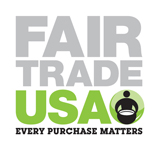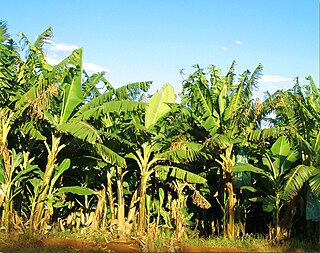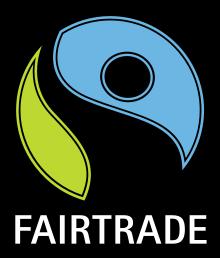
Fair trade is a term for an arrangement designed to help producers in developing countries achieve sustainable and equitable trade relationships. The fair trade movement combines the payment of higher prices to exporters with improved social and environmental standards. The movement focuses in particular on commodities, or products that are typically exported from developing countries to developed countries but is also used in domestic markets, most notably for handicrafts, coffee, cocoa, wine, sugar, fruit, flowers and gold.

Fairtrade International, or Fairtrade Labelling Organizations International e.V. is a product-oriented multistakeholder group aimed at promoting the lives of farmers and workers through trade. Fairtrade's work is guided by a global strategy focused on ensuring that all farmers earn a living income, and agricultural workers earn a living wage. Fairtrade works with farmers and workers of more than 300 commodities. The main products promoted under the Fairtrade label are coffee, cocoa, banana, flowers, tea, and sugar.

Co-operative Group Limited, trading as Co-op, is a British consumer co-operative with a group of retail businesses including food retail and wholesale, insurance, legal services, and funerals.

The Fairtrade Foundation is a charity based in the United Kingdom that aims to empower disadvantaged producers in developing countries by tackling injustice in conventional trade, in particular by promoting and licensing the Fairtrade Mark, a guarantee that products retailed in the UK have been produced in accordance with internationally agreed Fairtrade standards. The foundation is the British member of FLO International, which unites FLO-CERT, 25 National Fairtrade Organisations and 3 Producer Networks across Europe, Asia, Latin America, North America, Africa, Australia and New Zealand.

The Rainforest Alliance is an international non-governmental organization (NGO) with staff in more than 20 countries and operations in more than 70 countries. It was founded in 1987 by Daniel Katz, an American environmental activist, who serves as the chair of the board of directors. The NGO states that its mission is “to create a more sustainable world by using social and market forces to protect nature and improve the lives of farmers and forest communities.” Its work includes the provision of an environmental certification for sustainability in agriculture. In parallel to its certification program, the Rainforest Alliance develops and implements long-term conservation and community development programs in a number of critically important tropical landscapes where commodity production threatens ecosystem health and the well-being of rural communities.
The United Kingdom is home to a widespread and diverse co-operative movement, with over 7,000 registered co-operatives owned by 17 million individual members and which contribute £34bn a year to the British economy. Modern co-operation started with the Rochdale Pioneers' shop in the northern English town of Rochdale in 1844, though the history of co-operation in Britain can be traced back to before 1800. The British co-operative movement is most commonly associated with The Co-operative brand which has been adopted by several large consumers' co-operative societies; however, there are many thousands of registered co-operative businesses operating in the UK. Alongside these consumers' co-operatives, there exist many prominent agricultural co-operatives (621), co-operative housing providers (619), health and social care cooperatives (111), cooperative schools (834), retail co-operatives, co-operatively run community energy projects, football supporters' trusts, credit unions, and worker-owned businesses.

Wild Oats Marketplace is a producer of natural and organic food distributed through partnerships in the United States.
FLOCERT is one of the world’s leading social auditing and verification bodies and the global certifier for Fairtrade. With a vision of combating poverty and securing sustainable livelihoods for farmers in developing countries, FLOCERT's focus lies on auditing global supply chains and guaranteeing compliance with Fairtrade Standards.

The International Fairtrade Certification Mark is an independent certification mark used in over 50 countries. It appears on products as an independent guarantee that a product has been produced according to Fairtrade political standards.

Fair Trade USA, formerly "TransFair USA", is a 501(c)(3) non-profit organization that sets standards, certifies, and labels products that promote sustainable livelihoods for farmers and workers and protect the environment.

Fairtrade Canada, formerly TransFair Canada, is a national non-profit certification and public education organization promoting Fairtrade certified products in Canada to improve the livelihood of developing world farmers and workers. It is the Canadian member of FLO International, which unites 24 fair trade producer and certification initiatives across Europe, Asia, Latin America, North America, Africa, Australia and New Zealand.

Fairtrade Nederland formerly known as Max Havelaar Stichting is the Dutch member of Fairtrade International, which unites 23 Fairtrade certification producer and labelling initiatives across Europe, Asia, Latin America, North America, Africa, Australia and New Zealand.
The fair trade movement has undergone several important changes like the operation for ten thousand villages to open their businesses since early days following World War II. Fair trade, first seen as a form of charity advocated by religious organizations, has radically changed in structure, philosophy and approach. The past fifty years have witnessed massive changes in the diversity of fair trade proponents, the products traded and their distribution networks.
The fair trade debate concerns the ethics and economic implications of fair trade, and alleged issues with the Fairtrade brand in particular.

Nick Shaw is an independent film maker and background artist.

A banana plantation is a commercial agricultural facility found in tropical climates where bananas are grown.
Harriet Lamb CBE is the chief executive officer of Ashden, an organisation that supports and promotes sustainable energy enterprises from around the world. She was formerly the CEO of peacebuilding organisation International Alert, from November 2015 to April 2019. She was executive director of the United Kingdom Fairtrade Foundation from 2001 to 2012. Prior to this she was a leading campaigner for fair trade. In September 2012 she became chief executive officer of the global standards, certification and producer development organisation, Fairtrade International.

A fair trade certification is a product certification within the market-based movement fair trade. The most widely used fair trade certification is FLO International's, the International Fairtrade Certification Mark, used in Europe, Africa, Asia, Australia and New Zealand. Fair Trade Certified Mark is the North American equivalent of the International Fairtrade Certification Mark. As of January 2011, there were more than 1,000 companies certified by FLO International's certification and a further 1,000 or so certified by other ethical and fairtrade certification schemes around the world.
Fairtrade bananas was a marketing initiative which focused on increasing the price paid to small banana growers and the wages of agricultural workers. This is not a commercial brand, but a marketing strategy. Fair trade is based on higher prices paid by consumers that allow an equitable distribution of gains from trade over the chain partners.
The Fair Rubber Association, Fair Rubber e.V., is a non-governmental organization registered under German law. Its purpose is to apply the principles of fair trade to products made of natural rubber, in order to help improve the working and living conditions in particular of the primary producers of natural rubber, i.e. the tappers and small farmers involved in the procurement of raw latex milk.











